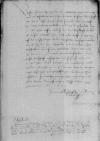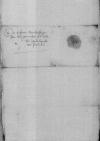List #4331
Ioannes DANTISCUS do Gdańsk Town CouncilLöbau (Lubawa), 1533-12-21
| odebrano Gdańsk (Danzig) Rękopiśmienne podstawy źródłowe:
Pomocnicze podstawy źródłowe:
| ||||||
Tekst + aparat krytyczny + komentarzZwykły tekstTekst + komentarzTekst + aparat krytyczny
Den ersamen, namhafftigen hern
Unsern fruntlichen grues mit erbittung, was wir liebs und wolgefallens vormugen, zuvoran. / Ersame, namhafftige hernn, besundre, gunstige freunde. /
Wie es negst zw
Dat(um) uff unserm slosse


 APG 300, 53, 249, p. 68
APG 300, 53, 249, p. 68